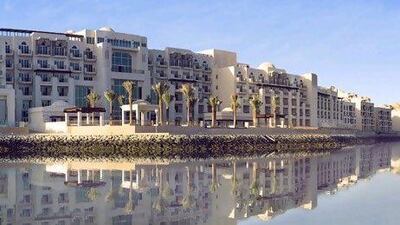Dh650,000 Annual rent for a four-bedroom penthouse in the Eastern Mangroves Promenade Apartments
Features This apartment measures 600 square metres, covers an entire floor and features four bedrooms, a family room, a majlis area, separate living and dining areas, a fully equipped kitchen and a huge 90-square-metre terrace
Pros Fabulous views of the mangroves from most rooms, bathrooms worthy of a five-star hotel, discounted services at the Eastern Mangroves Hotel, excellent finishes throughout and parque flooring in the bedrooms
Cons The project's dedicated retail complex is not due to be operational until the first quarter of next year. Construction of an additional 170 apartments (the second phase of the Eastern Mangroves Residences) is also underway, which may cause some disruption
They say Luxurious urban residences offering the exclusivity of resort-style living
We say We're sold! But 70 per cent of the units in the Eastern Mangroves Promenade Apartments have already been leased, so if you are interested, you had better hurry
Contact TDIC, 800 8342


